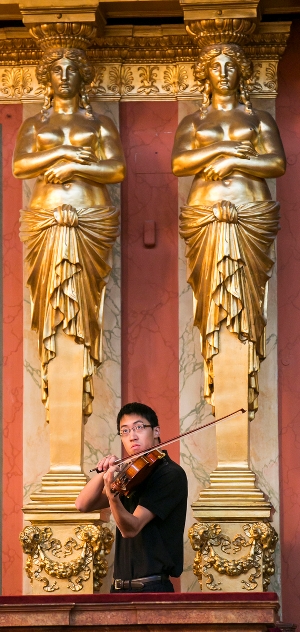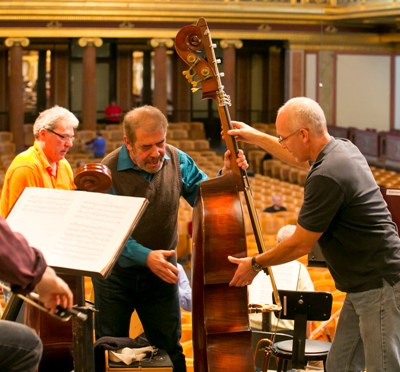Vienna Aisle: Comedic Muti leaves ’em laughing, and impressed by Chicago Symphony’s finesse
 Interview: Near the end of CSO’s latest European sojourn, music director Riccardo Muti reflects on his flair for levity and salutes his orchestra’s new image among Europeans proud of their musical culture.
Interview: Near the end of CSO’s latest European sojourn, music director Riccardo Muti reflects on his flair for levity and salutes his orchestra’s new image among Europeans proud of their musical culture.
By Lawrence B. Johnson
Photos by Todd Rosenberg
VIENNA – Habitués of Chicago’s Orchestra Hall have something in common with audiences in Vienna who heard the Chicago Symphony Orchestra’s final European tour concerts last week at the Musikverein. They know the droll, often outrageously funny side of the CSO’s artistically exacting music director, Riccardo Muti.
And Muti’s free-wheeling wit – whether ironic or self-effacing or risqué — is also a key factor in his close rapport with the orchestra’s musicians. In rehearsal, or by way of introducing an encore or simply in spontaneous address to an audience after a performance, Muti seems to delight in flights of whimsy. And always, he says, it’s off the cuff.
 “I never think I should do this way to obtain this result,” Muti recalled in a conversation a few hours before the CSO’s final Vienna performance of the Verdi Requiem on Nov. 2. “It’s just the way I am, for good or bad. Same thing when I make a speech to the audience. I never prepare what I will say.
“I never think I should do this way to obtain this result,” Muti recalled in a conversation a few hours before the CSO’s final Vienna performance of the Verdi Requiem on Nov. 2. “It’s just the way I am, for good or bad. Same thing when I make a speech to the audience. I never prepare what I will say.
“When I was young and had my first experiences talking to the public, I tried to figure out what to say and how to say it. But then I found out that at the moment I became confused because I didn’t remember exactly what I wanted to say. So I decided it would be much better to improvise.”
Introducing the tour’s habitual encore, Verdi’s “Nabucco” Overture, Muti had full houses in full laughter as he found a different way every night to explain how after such a great work as the one just played – Tchaikovsky Fourth Symphony or Schumann “Rhenish” or Scriabin “Le poème divin” – it was quite unthinkable to play anything more, such as, for instance, the Overture to “Nabucco.” Then through some arabesque of logic, the twinkle in his eye visible from the back of the house, he would arrive at the inevitable announcement: “Nabucco!”
 At the Musikverein, Muti distilled his circuitous encore preamble to a terse question that he certainly intended as rhetorical: “What do you think about Verdi?” This from the foremost Verdi conductor of our time. And addressed, one should add, to a public that dotes on Muti like an adopted son. The implicit response was clear enough: “If you will conduct it, we will stay.”
At the Musikverein, Muti distilled his circuitous encore preamble to a terse question that he certainly intended as rhetorical: “What do you think about Verdi?” This from the foremost Verdi conductor of our time. And addressed, one should add, to a public that dotes on Muti like an adopted son. The implicit response was clear enough: “If you will conduct it, we will stay.”
With one performance to go at the Musikverein before the orchestra headed back to Chicago after a tour that swung from Warsaw, Luxembourg and Geneva to Paris and Vienna, Muti declared the venture “a big success – not only with the public but with the European critics.”
It’s important for the image of the Chicago Symphony to be recognized as one of the greatest orchestras in the world. But winning that assessment from European connoisseurs has posed a formidable challenge, Muti says.
“Europeans have always been very difficult with the Americans. There’s still a certain skepticism,” he said, extending upturned palms in mock resistance and speaking in the voice of dubious observers: “‘We are the Europeans. We produced Bach, Beethoven, Brahms, etc. They are part of our culture. We see American orchestras generally like very good, strong machines, but not always very flexible.’
“I’m not saying I agree, but this is the attitude. For Europeans, the phrase à la Americana (in the American way) is derogatory. We know Chicago and Cleveland are big orchestras, but they have to demonstrate their versatility.”
 Some European orchestras may be less perfect as ensembles, he said, but it’s more natural for them to grasp the spirit and style — if not the technical wizardry — with which the Vienna Philharmonic plays Schubert, for example.
Some European orchestras may be less perfect as ensembles, he said, but it’s more natural for them to grasp the spirit and style — if not the technical wizardry — with which the Vienna Philharmonic plays Schubert, for example.
“Schubert was Vienna, was Austria. Bruckner was Austria – like Verdi was Italy, ” says Muti. “It’s what Yo-Yo Ma calls ‘the authority of the country.’”
In no small way, Vienna’s devotion to Muti springs from his decades of opera performances here and at the nearby Salzburg Festival, where his Mozart became legendary. Back in the early 1970s, before Muti had an international reputation, he was invited to the festival by that Olympian ruler of Salzburg, conductor Herbert von Karajan. In time, Muti’s reputation with Mozart came to equal his stature in Verdi.
Between 1996 and 2002, Muti conducted new productions of Mozart’s three da Ponte operas at the Theater an der Wien, the beloved old venue that saw several Beethoven premieres including his opera “Fidelio,” the Violin Concerto and several symphonies. In that light, looking ahead to Muti’s next five years with the CSO, it seemed plausible to suggest that he might bring concert versions of “Le nozze di Figaro,” “Cosi fan tutte” and “Don Giovanni” to Chicago.
But the conductor shook his head. “That would be wonderful, but if you do ‘Nozze,’ what about the trombones, the four horns, the reduced number of strings?” In other words, what does half the high-powered CSD do on those nights, sit backstage playing poker?
 What clearly will not happen on Muti’s watch is any operatic presentation at Orchestra Hall that might be described as semi-staged. The idea of half-baked Mozart or Verdi is anathema to him.
What clearly will not happen on Muti’s watch is any operatic presentation at Orchestra Hall that might be described as semi-staged. The idea of half-baked Mozart or Verdi is anathema to him.
“I am against everything that is semi,” he said. “It either is or it isn’t. What does it mean, semi-staged? It means singers dressed without a real regie (production). They come in, they move their arms in the most stupid ways, touch each other – ‘I love you,’ ‘I hate you,’ ‘I’m suffering.’ The conductor looks at the orchestra, the singers are behind him. He communicates with his bottom.
“I need to have the singers in front of me. Yesterday in the Requiem, the soprano and I were looking into each other’s eyes. We were making music, communicating with the eyes. If she’s behind me, where’s the communication. Semi-staged? It is a fraud.”
 Although the CSO had played the tour repertoire several times, there was yet another rehearsal to get a feeling for the Musikverein when the orchestra arrived for its weeklong residency, and two rehearsals for the Verdi Requiem. Here Muti once more conjured the wit-infused atmosphere typical of his rehearsal style, where large issues are managed with levity and the small stuff draws more gravitas.
Although the CSO had played the tour repertoire several times, there was yet another rehearsal to get a feeling for the Musikverein when the orchestra arrived for its weeklong residency, and two rehearsals for the Verdi Requiem. Here Muti once more conjured the wit-infused atmosphere typical of his rehearsal style, where large issues are managed with levity and the small stuff draws more gravitas.
Muti says he learned long ago that getting too caught up in the emotional moment of the music at hand can produce unfortunate results.
“You should have a part of your brain that controls exactly what you’re doing,” he said. “If it’s tragic music and you’re in a completely tragic mood, it’s a disaster. I never determine in advance how I might solve some problem in rehearsal. Certain difficult situations can be solved in a lighter way – by not increasing the dramatic aspect of the situation. Other times, even for less important things, I can be tougher. Generally, I am more forceful and serious in situations that seem less dramatic.
 “I never react to mistakes. We all must make mistakes because we are human. But I react always in a very strong way when I see people who don’t give everything in their work. We are privileged to do this work. We are not working on roads, but have the privilege to make music in beautiful concert halls. When I see somebody – not our orchestra – who takes this for granted, I get really upset.”
“I never react to mistakes. We all must make mistakes because we are human. But I react always in a very strong way when I see people who don’t give everything in their work. We are privileged to do this work. We are not working on roads, but have the privilege to make music in beautiful concert halls. When I see somebody – not our orchestra – who takes this for granted, I get really upset.”
At the tour’s culmination, Muti saw the Chicago Symphony elevated in the judgment of the European public and critics alike. Sheer potency, he said, had been trumped by finesse:
“In the past, American orchestras have tried to prove themselves in a muscular way: ‘We are John Wayne.’ It didn’t work. Europeans are more inclined to appreciate subtlety than power. On this tour, one important critic wrote that the Chicago Symphony now sounds more European than before. Coming from a European paper, that is a compliment.”
Related Links:
- Happily tuned to CSO, Muti nixes idea of position at Vienna State Opera: Read the interview at ChicagoOntheAisle.com
- Mid-tour in Paris, CSO and Muti raise a roof with Tchaikovsky and Schumann: Read the review at ChicagoOntheAisle.com
- In Vienna, Tannhäuser is a bold psychological thriller at the Staatsoper: Read the review at ChicagoOntheAisle.com
Tags: Chicago Symphony Orchestra, Riccardo Muti, Theater an der Wien, Vienna Musikverein














